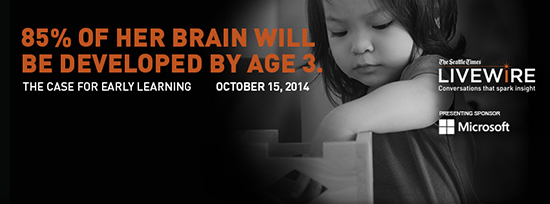To get more girls into tech careers we need to counteract negative stereotypes about the field, UW and I-LABS research shows. Women make up only about 20 percent of the recipients of bachelor’s degrees in computer science, creating a large gender disparity. This gap has received ample attention for its causes and what can be done about it. “Women are missing out … Read More
In National Geographic, Patricia Kuhl explains why a baby’s brain holds the key to understanding what it means to be human.
Photo caption: In Patricia Kuhl’s lab at the University of Washington, researchers study brain activity in babies less than a year old using a magnetoencephalography device, which measures the magnetic field around a baby’s scalp, to reveal the pattern of neurons firing. How nature and nurture combine to shape the brain is nowhere more evident than in the development of … Read More
El País: Bilingualism the Best Workout for Brain
The Spanish newspaper El País features I-LABS’ Patricia Kuhl and Andrew Meltzoff in a story about how knowing a second language helps other aspects of cognitive function. The El País story, “Bilingualism: The best workout for your brain,” was published Nov. 24. Earlier this fall, Meltzoff and Kuhl traveled to Madrid to give invited lectures on their research. They also … Read More
Making Steps Toward Brain-to-Brain Communication
I-LABS’ Andrea Stocco and Chantel Prat have shown that information can be transferred from one adult brain to another. Imagine learning something new without studying, becoming alert without a jolt of caffeine, or recovering motor or speech functions after a brain injury without extensive rehabilitation training. Stocco and Prat, of the University of Washington’s Institute for Learning & Brain Sciences, … Read More
Quality of Words, Not Quantity, Is Crucial to Language Skills
A New York Times story describes research from I-LABS and others showing how it will take more than greater exposure to language to narrow the educational gap faced by children from low-income families. The White House held a summit Oct. 16 to talk about how to close the “word gap,” a disparity in which young children from low-income families hear … Read More
Video: Early Childhood Prime Time for Education, Researchers Say
At an event organized by the Seattle Times and Microsoft, Patricia Kuhl and Andrew Meltzoff, I-LABS co-directors, talked about how babies are born learning but their brains need the right inputs. Update Dec. 8, 2014: Watch the Seattle Times’ LiveWire event, “The Case for Early Learning,” on TVW. It will be broadcast Dec. 11, 2-4pm (channel information is online). Or watch it … Read More
Q&A on ‘The Case For Early Learning’
How do children learn from birth to age 3? Our experts weigh in on what science shows in brain development, what parents and caregivers can do to help young children be school ready, and characteristics of quality early learning programs. Patricia Kuhl and Andrew Meltzoff, co-directors of the University of Washington’s Institute for Learning & Brain Sciences, will give a presentation “Brain Science and … Read More
New York Times: Is E-Reading to Your Toddler Story Time or Screen Time?
Patricia Kuhl, I-LABS co-director, is quoted in a story about whether e-books and other digital media give the same developmental benefits for children. A front page story of the New York Times on Sunday, Oct. 12 opens with a question that’s on many parents’ minds: Does reading to your child on an e-book, iPad or other digital device count as … Read More
Infant, Control Thyself
The latest I-LABS research shows that toddlers who watch an argument use that emotional information to avoid making adults angry. The study, led by I-LABS’ Betty Repacholi and Andrew Meltzoff, shows that children as young as 15 months can detect anger when watching other people’s social interactions and then use that emotional information to guide their own behavior. “Through studying … Read More
What Makes Children Do Their Best?
The Seattle Times profiles Onnie Rogers, a postdoc at I-LABS. I-LABS postdoctoral fellow Leoandra “Onnie” Rogers is the first in her family to attend college, has a doctorate in developmental psychology, and will soon be inducted into UCLA’s Athletics Hall of Fame. Rogers works with I-LABS co-director Andrew Meltzoff. She’s interested in identity development among youth, and her research examines children’s … Read More







